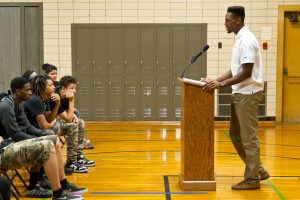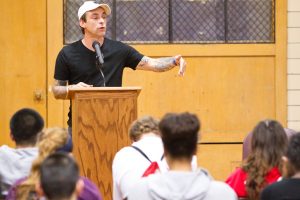Scavo Students Hear One-Two Punch to Stay in School
Students at Scavo Alternative High School absorbed a powerful one-two punch of storytelling Tuesday that maybe was a tad more attention-getting than the counsel of their teachers can be by itself.
In the morning Iowa State Men’s Basketball Assistant Coach Cornell Mann brought Cyclone players Melvin Ejim and Percy Gibson along with him to speak from personal experience about the value of education. Their visit was part of a program called “Stay in to Win” under the auspices of the National Association of Basketball Coaches (NABC). It happened in the gym but there were no basketballs involved. In fact, Ejim’s primary reference to his athletic ambitions was when he declared his goal of leading the team this season in GPA. Given his standing as an Academic All-American you gotta like his chances.
Coach Mann confided that when he was the age of his audience, “I hated school.” But, he was quick to add, “I never missed a class. Life was tough where I came from in Detroit but I was tougher than my problems.” Now he has a great job that he loves and will receive a Master’s Degree in Higher Education and Leadership next spring.
Ejim grew up the eldest of a dozen kids and Gibson the youngest (and tallest, he emphasized with a grin) of four. Both of them talked about some motivators and rewards that have been critical in keeping their noses to the academic grindstones in addition to more obvious payoffs like better job prospects.
“Little things like the smile on my mom’s face when I graduated from high school keep me going when I don’t feel like studying,” said Gibson. “She was a single parent and worked hard so I could have a chance.”
Ejim takes very seriously his status as role model for his 11 younger siblings and, lest anyone figure he’s only in school for the basketball, “I’m majoring in history and hope to become a lawyer eventually,” he told the students.
Compelling as Round I had been, the afternoon session was especially so. The speaker was Frank Meeink, author of Autobiography of a Recovering Skinhead. Frank is frank.
He grew up on mean streets in a mean home in Philadelphia. “My goal most days was to get hit by a car so I wouldn’t have to go home,” he recalled. “But the instinct for self-preservation made my legs jump me outta the way. I used to think I was so worthless I couldn’t even get hit by a car.”
One of 20 white kids in a high school with 1,300 students, he fell under the sway of an Aryan supremacy group he was exposed to by a cousin from rural Pennsylvania. It was the first context where he ever experienced acceptance and the first where he felt feared instead of afraid. “I’ll never forget the look in that guy’s eyes and the feeling inside of me,” he said in describing the night when the sensation of power gripped him.
Meeink’s story unfolded almost like a contemporary adaptation of Jean Valjean’s in Les Miserables, except that, by his own admission, he really was a bad guy. Prison hardened him but eventually the kindness of people who belonged to groups he’d been taught to despise softened and reformed him. A black stranger on a bus with whom he swapped prison anecdotes and a Jewish antiques dealer who hired him when no one else would, the swastika tattoo on his neck notwithstanding, overcame the darkness that had always shrouded his life.
“Believe it or not, I’d never heard of DNA,” he said. “I started reading and I figured out that we’re all so alike.”
Eventually he got the swastika removed. “It was extremely painful but it also felt so good,” he said. The erasure of his most visible and blatantly offensive tats is the perfect metaphor for his personal rebranding. But there are some scars that run too deep to get at. Out of all the sordid past he summarized, Meeink singled out the time in the restroom at that high school in Philadelphia when he walked in on a kid being beaten by a group and did nothing to help him as the biggest regret of his life.
But it’s not big enough to have stopped him from helping lots of kids now. Maybe it’s part of his motivation. From his base right here in Des Moines Meeink travels and speaks all over the world. He also runs a youth hockey (“the greatest game in the world”) program for inner city kids in New Jersey and is working locally with state legislator Ako Abdul-Samad on what he calls a peace treaty among the local youth gangs that he hopes will become the start of a nationwide movement.
Meeink carried the message that no one in the crowd had made any mistake that was irrevocable.
“I applied for a job in marketing with a hockey team. I didn’t have any of the mandatory background but I told ‘em, ‘look, I used to recruit nerds to be neo-nazis. I think I can get people to come to a hockey game.’ They hired me on the spot.”
He’s deadly serious for the most part, but on a personal note he really brightened when someone in the crowd asked about the daughter he mentioned who was born when he was in prison.
“She’s 19 now,” he said, beaming. “One time a kid asked if he could see my best gang marking. I pulled out my wallet and showed him a picture of my family and said, ‘right here’s the greatest gang I’ve ever been part of.’ My daughter called me a while back to tell me about her boyfriend. She said he was mixed and that she knew that wouldn’t matter to me and I said, ‘beautiful.'”






